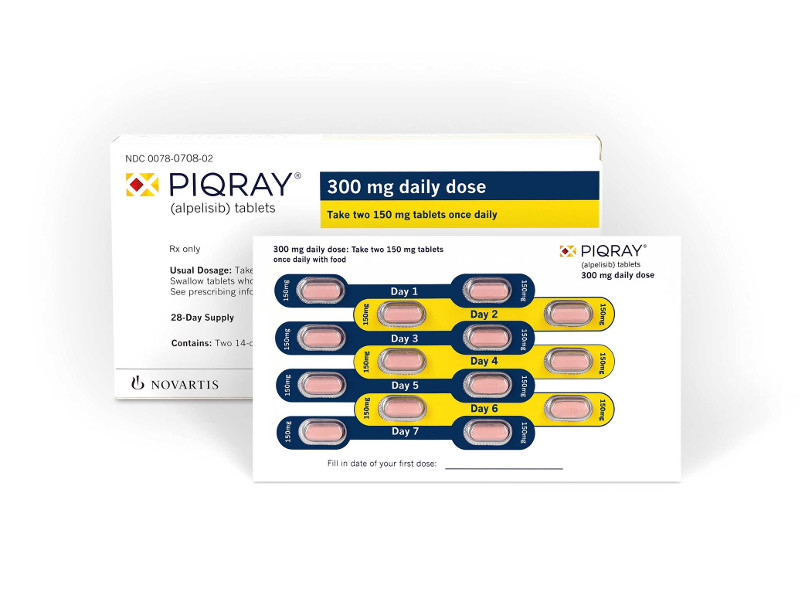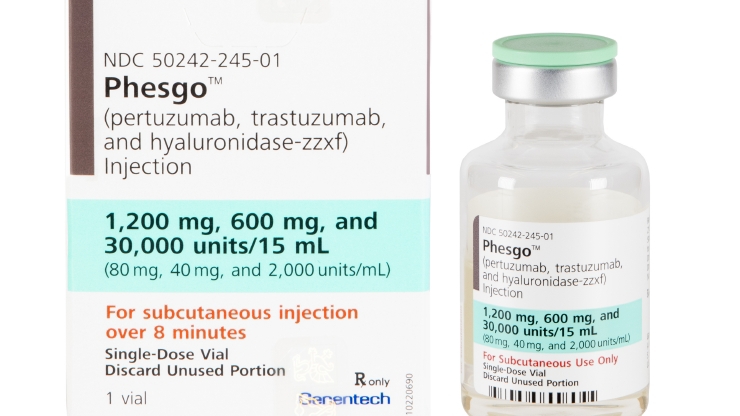Piqray (alpelisib) vs Phesgo (pertuzumab, trastuzumab, and hyaluronidase)
Piqray (alpelisib) vs Phesgo (pertuzumab, trastuzumab, and hyaluronidase)
Piqray (alpelisib) is a targeted therapy specifically designed for patients with HR-positive, HER2-negative, PIK3CA-mutated advanced or metastatic breast cancer, often used in combination with fulvestrant after progression on endocrine therapy. Phesgo, on the other hand, is a combination of two monoclonal antibodies, pertuzumab and trastuzumab, along with hyaluronidase, and is used for the treatment of HER2-positive breast cancer in early and metastatic stages, administered subcutaneously to simplify the delivery of treatment. The choice between Piqray and Phesgo would depend on the specific subtype of breast cancer a patient has, as Piqray is not suitable for HER2-positive tumors, while Phesgo is specifically designed to target the HER2 protein.
Difference between Piqray and Phesgo
| Metric | Piqray (alpelisib) | Phesgo (pertuzumab, trastuzumab, and hyaluronidase) |
|---|---|---|
| Generic name | Alpelisib | Pertuzumab, Trastuzumab, and Hyaluronidase-zzxf |
| Indications | Advanced or metastatic breast cancer with PIK3CA mutation | HER2-positive breast cancer |
| Mechanism of action | PI3K inhibitor | HER2/neu receptor antagonist & hyaluronidase enzyme |
| Brand names | Piqray | Phesgo |
| Administrative route | Oral | Subcutaneous injection |
| Side effects | Hyperglycemia, rash, diarrhea, fatigue, etc. | Diarrhea, alopecia, nausea, fatigue, etc. |
| Contraindications | Severe hypersensitivity to alpelisib | Severe hypersensitivity to active substances or excipients |
| Drug class | Antineoplastic agent | Antineoplastic agent |
| Manufacturer | Novartis Pharmaceuticals | Genentech, Inc. |
Efficacy
Piqray (Alpelisib) Efficacy in Breast Cancer
Piqray (alpelisib) is a medication specifically approved for the treatment of hormone receptor (HR)-positive, human epidermal growth factor receptor 2 (HER2)-negative, PIK3CA-mutated, advanced or metastatic breast cancer. This indication is for use in combination with fulvestrant after disease progression following endocrine therapy. The efficacy of Piqray was primarily demonstrated in the SOLAR-1 clinical trial, which showed a significant improvement in progression-free survival (PFS) in patients with a PIK3CA mutation when compared to placebo plus fulvestrant. The trial found that patients treated with Piqray had a median PFS of 11.0 months versus 5.7 months for those on the placebo, indicating a substantial delay in disease progression for the Piqray group.
Phesgo (Pertuzumab, Trastuzumab, and Hyaluronidase) Efficacy in Breast Cancer
Phesgo is a combination of two monoclonal antibodies, pertuzumab and trastuzumab, with the enzyme hyaluronidase, and is used for the treatment of HER2-positive breast cancer. It is indicated for use in combination with chemotherapy for the treatment of early breast cancer at high risk of recurrence and for metastatic settings. The efficacy of Phesgo was established through studies that compared its use with pertuzumab and trastuzumab administered separately. The results demonstrated non-inferior levels of pertuzumab and trastuzumab in the blood, suggesting that Phesgo is as effective as the separate administrations of pertuzumab and trastuzumab when used alongside chemotherapy.
Both Piqray and Phesgo represent targeted therapies that have expanded the options for personalized treatment in breast cancer. Their development reflects the ongoing shift towards precision medicine, where treatments are tailored to the specific genetic and molecular characteristics of a patient's cancer. As such, they offer hope for improved outcomes in subsets of breast cancer patients with specific biomarkers, namely PIK3CA mutations for Piqray and HER2-positivity for Phesgo.
It is important to note that the efficacy of these treatments can vary based on individual patient factors, and they are not suitable for all breast cancer patients. The use of Piqray and Phesgo should be guided by a healthcare professional with consideration of the patient's specific type of breast cancer, genetic profile, and prior treatments. Patients should discuss the potential benefits and risks of these therapies with their oncologist to determine the most appropriate treatment plan for their condition.
Regulatory Agency Approvals
Piqray
-
European Medical Agency (EMA), European Union

-
Food and Drug Administration (FDA), USA

Phesgo
-
European Medical Agency (EMA), European Union

-
Food and Drug Administration (FDA), USA

Access Piqray or Phesgo today
If Piqray or Phesgo are not approved or available in your country (e.g. due to supply issues), you can access them via Everyone.org.
How it works

Make an enquiry
Choose the medicine you want to buy, answer a couple of questions, and upload your prescription to speed things up. We’ll get back to you within 24 hours.


Make an enquiry
Choose the medicine you want to buy, answer a couple of questions, and upload your prescription to speed things up. We’ll get back to you within 24 hours.


Breeze through the paperwork
We'll guide you through the required documents for importing unapproved medicine, ensuring you have all the necessary information.


Get a personalized quote
We’ll prepare a quote for you, including medicine costs and any shipping, administrative, or import fees that may apply.


Receive your medicine
Accept the quote and we’ll handle the rest - sourcing and safely delivering your medicine.

Some text on this page has been automatically generated. Speak to your physician before you start a new treatment or medication.
Let's talk
If you have any questions, call us or send us a message through WhatsApp or email:
Contact us




